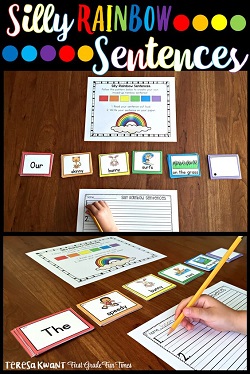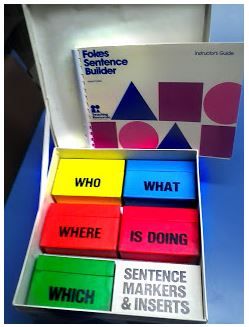Correct word order has a significant role in teaching a foreign language. Many learners automatically order the words in a sentence as in their native language. However, since different languages have various sentence structures, ESL teachers should be very attentive in dealing with this topic. Despite its difficulty, it can be taught in fun and entertaining ways to primary school children. Here we present activities that will definitely come in handy to practise word order with your kids.
Rainbow sentences
One of the fascinating ways of practising word order with kids is definitely with Rainbow order. Distribute the mixed parts of the sentence to your students and ask them to put the words in the correct order according to rainbow colours (red, orange, yellow, green, blue, indigo, violet). To make it more fun, you can also play the rainbow song. Children really enjoy doing this activity.

Question cards
Use question cards to introduce the rules of word order to your students, such as Who/what, what happens, where, when, etc. Provide with an example (Bob goes to school every day.) and get your students to put the mixed words in the correct order.

Expanding the phrase
Write a word on the board. Ask your students to take in turns and add extra words to make it into a longer and longer sentence. It must be a logically coherent sentence. Students cannot remove words, but they can change the order while adding new words. My kids really enjoy this activity, especially when I ask them to use their imagination and expand the phrase in a funny way.
Cat
- A black cat
- A big black cat
- Tom saw a big black cat
- Tom saw a big black cat in the forest
- Tom saw a big black cat in the forest last night
Removing words from a sentence
This activity is considered to be the opposite of the previous one. Here you provide your students with a long sentence and ask them to take turns and to remove words so that it always remains a sentence.
- Kate doesn’t like cartoons because they are loud, so she doesn’t watch them.
- Kate doesn’t like cartoons because they are loud, so she doesn’t watch.
- Kate doesn’t like cartoons because they are loud.
- Kate doesn’t like cartoons.
Brainstorming sentences
Ask your students to work in pairs or in groups. Choose a topic that the students are familiar with (weather, animals, food, jobs, etc) and get them to make up as many correct and long sentences as possible.
Example: Animals
Group A: Crocodiles are very dangerous animals.
Group B: Many people are afraid of spiders and not mice.
Group A: It is very difficult to survive crocodile’s attack because they attack very quickly.
Group B: Last summer, when we were staying in a forest, we suddenly saw a wolf near our tents.
Gringle
This is a guessing game. Choose a player, who will think of a verb his/her classmates must guess what verb this student is thinking of. The verb is replaced by a nonsense word such as “gringle”. The students then ask questions, like this:
— Can you gringle at night?
— Who gringles more — girls or boys
— Do you use a special object to gringle?
— When do you usually gringle?
— Is gringling a fun or a serious action?
Why do people gringle?This game is a magnificent tool for practising word order in interrogative sentences with your kids. With the help of numerous questions, they revise different types of questions, such as General and Special ones.
This was the list of the activities that I usually use with my kids to practise word order. I am sure you are aware of some other fascinating ways as well. Share them in the comments below.
|
|
|
|
|
|
|
|
|
|
|
|
|
|
|
|
|
|
|
|
|
|
|
|
|
|
|
|
|
|
|
|
|
|
|
|
|
|
|
|
|
|
|
|
|
|
|
|
|
|
|
|
|
|
|
|
|
|
|
|
|
|
|
|
It has been said that the true grammar of English lies in word order. Unlike many languages which are heavily inflected and word endings show whether it is, for example, the subject of a verb or its object, English words can usually only be distinguished by their position in the sentence or by the presence of a preposition.
So, in English the following sentences are very different in meaning.
- Tony kissed Melinda.
- Melinda kissed Tony.
In neither is it safe to assume that they kissed each other — only that one was kissed by the other. In the first sentence Tony did the kissing and so is the subject of the sentence while Melinda was on the receiving end and is therefore its object, whereas in the second sentence these roles are reversed.
The usual word order in a basic English sentence is
Subject/Verb/Object (SVO)
Obviously, it is essential that speakers of heavily inflected languages are made aware of this as quickly as possible in their studies. Hence this is usually introduced at the outset in the very first level. In teaching basic sentence word order (SVO) a great deal of repetition is necessary and all good books provide this. The usual method adopted by the books is to give example sentences and then to point out the word order to the students. They then get the opportunity to practice this before being asked to produce some examples of their own. This can often be a little dry and the example sentences are usually at best uninspiring. The teacher may be best advised to come up with some interesting sentences of their own using action verbs such as kiss, hit etc. They will, of course, need to be pre-taught but action verbs can usually be demonstrated and so present no difficulty.
One very simple way of giving students practice in this is to make cards with different verbs and nouns on then put them into pairs to see how many SVO sentences they can make in 5 minutes. Picture prompts to get them to make particular sentences are a good addition. The basic word sets can be expanded to include adjectives, adverbs, pronouns, auxiliary verbs, etc. as the course progresses. Having mastered basic sentence word order students can then move on to sentences which have both direct and indirect objects, negative sentences and word order in questions. An element of competition can be added to the word card activity by conducting races to form correct sentences, by speed dictations, or by miming sentences for students to write down. Another activity might be for students to be given word cards and then asked to line themselves up so as to form a correct English sentence.
In later levels the idea of adjectival order is added – most native English speakers have no idea that there is such a thing but get it right intuitively. If you are uncertain what adjectival order is, consider the following sentence fragments.
A wonderful, long, silk scarf
A long, silk, wonderful, scarf*
No prizes for guessing which is right and which is wrong.
WORD ORDER
- Put the words in the right order.
1. like, he, his homework, in the evening, doesn’t, he, to do
2. usually, we, on weekends, meet, friends, our
3. is, table, sitting, he, the, at
4. didn’t, to, Peter, party, the, go
5. in, we, New Year, celebrate, December
6. used, children, computer, play, to, games.
7. school, on, weekends, we, don’t, to, go
8. can, help, cake, to, the, I, you, cook
9. are, they, to, next, going, visit, Paris, summer
10. Mike, the, is, Internet, now, surfing
- Put the words in the right order in sentences.
1. to the park, go, I, won’t, I, have, if, much work
2. the weather, fine, is, if, tomorrow, will go, on, we, a picnic
3. if, save, enough, I, will, money, buy, car, a new
4.pass, my exams, I, if, will, to, I, the University, go
5. I, my work, when, finish, watch, I, TV, will
- Find mistakes in the sentences and write down correct ones.
1. My mother me walk after 9 o’clock told not to in the evening.
_________________________________________________________________
2. Michael promised with homework to help me.
_________________________________________________________________
3. were reading a book for two hours they.
____________________________________________________________________________________
4. We at 7 o’clock in the morning get up.
__________________________________________________________________
5. I usually don’t go on weekdays to the shop.
__________________________________________________________________
Worksheets
Powerpoints
Video Lessons
Search
Filters
SELECTED FILTERS
Clear all filters
- English ESL Worksheets
- Grammar Topics
- Word order
SORT BY
Most popular
TIME PERIOD
All-time
etorrall
88596 uses
illjarn
54205 uses
dandanfrieds
47178 uses
irepaju
40987 uses
ladygargara
36458 uses
luisapesquera
24362 uses
Prinkle
23384 uses
luisapesquera
12526 uses
feliciana
11611 uses
Tanuja1809
10922 uses
seni77
9210 uses
Apodo
9144 uses
Next
51
Blog
FAQ
About us
Terms of use
Your Copyright
Read the word order rules and tendencies and then try the practice exercise.
Rules and Tendencies
- For expressions of time and place, the order is subject + verb + object + place + time.
I write my reports at my desk every morning. (subject/verb/object/place/time)
Kate swims laps in the pool every night. (subject/verb/object/place/time)
- We put adverbs of frequency before the main verb or after the verb to be.
Adverbs of frequency include always, usually, normally, generally, often, sometimes, never. Sometimes is an exception — it can also be placed at the beginning of a sentence.
John often gets to work early.
John is often here early.
Sometimes John gets to work early.
John sometimes gets to work early.
- We don’t normally put an adverb between a verb and its object.
I like English a lot.
I like a lot English.
- Some questions have prepositions at the end of clauses.
Where are you from?
What school did you go to?
What was the meeting about?
- The subject and verb must be inverted in a variety of situations. See this explanation from about.com.
Practice Exercise
Every sentence has a common word order mistake that English language learners make. Write the correct word order of the sentence in the blanks. More than one answer may be possible.
Additional word order exercises from around the web:
http://www.englisch-hilfen.de/en/complex_tests/word_order1/task.php
http://www.better-english.com/grammar/wordorder.htm
http://www.autoenglish.org/mistakes/mis-order.pdf
Educaplay uses its own and third-party cookies for anonymous analytical purposes, save the preferences you select, personalize the advertising you see based on your browsing habits and for the general operation of the page.
You can accept all cookies by clicking the «Accept» button or configure or reject their use by clicking the «Set up» button.
You can obtain more information and reconfigure your preferences at any time in the Cookies policy
If you are under 14 years old, ask your parent or guardian to read this message before continuing.

Re write these sentences using correct word order.
Created by
-
1
-
2
-
3
-
4
-
5
Do you want to stay in the Top 10 of this activity? Log in to identify yourself.
Create your own free activity from our activity creator
Compete against your friends to see who gets the best score in this activity
Упражнения «Порядок слов в предложениях»
(Word order)
1. Расставьте слова в
предложениях по порядку.
1.
usually / at 10 o’clock / out of the garage / in the morning /
drives / his bike / Fred
2.
a shower / after dinner / often / Mrs Lewis / takes
3.
a parking place / near the library / we / find / seldom
4.
to / I / on / a / night-club / sometimes / Saturdays / go
5.
fly / my parents / to Australia / sometimes / I / in winter /
and
6.
enjoys / very much / swimming / in the pool / always / Mary
7.
hardly / last year / could / skate / I
8.
is / near / house / there / new / a / our / cinema
9.
got / my / problems / I / with / have / home-task / some
10. well / think / your / very / I / don’t / sister / drives
11. to / parents / once / the theatre / month / my / a / go
12. his / car / two / ago / Jim / sold / years
13. necklace / can’t / anywhere / Cindy / her / find
14. been / to / India / Mike / has / year / already / this
15. lunch / never / weekdays / she / has / on
2. Переведите.
1.
Телевизор я смотрю редко.
2.
На улице темно, и я скоро
поду спать.
3.
Они что-то очень шумно
обсуждают в спальне.
4.
Он медленно шел вдоль реки.
5.
На уроках мы часто поем
песни.
6.
Я тихо закрыла дверь и сразу
же пошла в ванну.
7.
Мой дядя очень любит
рыбалку.
8.
Анна умеет хорошо играть в
теннис.
9.
Она все время кричит на
детей.
10. Твои книги я положу на стол.
11. Я недостаточно хорошо его знаю.
12. По телевизору много хороших фильмов сегодня.
13. В парке есть красивый фонтан.
14. В прошлый вторник было очень ветрено.
15. Эти туфли я купила в Италии.
3. Выберите верный порядок
слов в придаточной части предложений.
1.
Could you tell us what time … (it is – is it – does it)?
2.
Do you know when … (our bus leave – our bus leaves – does our
bus leave)?
3.
I wonder if … (he is a doctor – is he a doctor – a doctor is he).
4.
Do you remember what … (did Jane wear – Jane wear – Jane wore)
yesterday?
4. На основе приведенных слов
постройте предложения, соблюдая порядок слов:
1. she, won, easily, the game
2. tennis, every weekend, Ken, plays
3. quietly, the door, I, closed
4. his name, after a few minutes, I, remembered
5. a letter to her parents, Ann, writes, every week
6. some interesting books, found, we, in the library
7. across from the park, they, a new hotel, are building
8. to the bank, I, every Friday, go
9. on Saturday night, didn’t see, at the party, you, I
10. brightly, is, shining, sun, the
11. in, lives, my, sister, New York
12. a, became, doctor, good, Mary
13. a, decided, go, on, picnic, to, we
5. Отметьте предложения, в
которых нарушен порядок слов, и перестройте их в соответствии с правилами:
Образец: Tom walks every morning to work. — Tom walks to work every
morning.
1. Jim
doesn’t like very much baseball.
2. Ann drives every day her car to work.
3. When I heard the news, I immediately called Tom. (immediately – сразу)
4. Maria speaks very well English.
5. After eating quickly my dinner, I went out.
6. You watch all the time television.
7. Liz smokes about 20 cigarettes every day.
8. I think I’ll go early to bed tonight.
9. You should go to the dentist every six months. (should – следует)
10. We went last night to the movies.
11. We go every summer to the sea in August.
12. In the evening my parents go to the cinema with their friends.
6.
Исправьте, если это необходимо, местоположение подлежащего согласно правилу о
порядке слов в предложении.
1.
Curly hair has her brother.
2.
Steve likes cakes.
3.
A bad cold has Jessica.
4.
These exercises I did well.































































